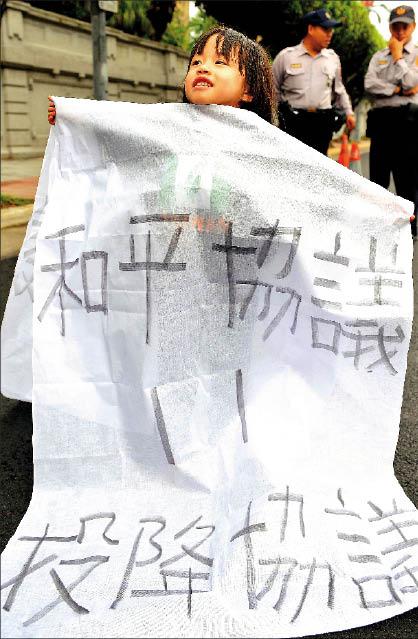A leaked US cable shows that American Institute in Taiwan (AIT) Chairman Raymond Burghardt warned President Ma Ying-jeou (馬英九) in 2007 that cross-strait dialogue on various issues, including a peace agreement, could be at the expense of US arms sales to Taiwan.
Following heated debate on whether to start political talks with China that could potentially lead to unification if Ma is re-elected in January after he proposed the idea on Monday, Ma said on Thursday that a pact would not be signed unless strict prerequisites were met.
However, a cable dated June 18, 2007, and released by WikiLeaks on Aug. 30 details a meeting between Ma, then the Chinese Nationalist Party’s (KMT) presidential candidate, and Burghardt, which appears to suggest otherwise.

Photo: Chu Pei-hsiung, Taipei Times
The cable quoted Ma as telling Burghardt that he “would accept a peace agreement of either limited or unlimited duration” if elected president on March 20, 2008.
Burghardt, in the company of then-AIT director Stephen Young, visited Ma, who was accompanied by his top national security aide, Su Chi (蘇起), on June 16.
During their talks, Ma told the US officials that he would implement “five do’s” and honor then-president Chen Shui-bian’s (陳水扁) “four noes” pledge if he were elected president.
The “five do’s” included resuming dialogue with Beijing, establishing military confidence-building measures, creating a China--Taiwan common market, reaching a modus vivendi on international organizations and expanding cross-strait cultural and educational exchanges, the cable says.
The cable says Ma told Burghardt that he “would condition any negotiation of a peace agreement on the PRC’s [People’s Republic of China] removal of missiles aimed at Taiwan, adding that he would accept a peace agreement of either limited or unlimited duration.”
Burghardt predicted that China would attempt to condition any dialogue on Taiwan suspending arms purchases from the US, the cable says.
Both Ma and Su in response said that would be “unacceptable.”
They said Beijing would tolerate continued US arms sales as long as Taiwan’s leadership did not antagonize China by pushing an independence agenda, the cable says.
When they talked about the 2008 presidential election, Ma told Burghardt that then-Democratic Progressive Party (DPP) presidential candidate Frank Hsieh (謝長廷) had rehashed charges that Ma was “a Mainlander,” that he “does not love Taiwan” and that he intended to counter such attacks by emphasizing the KMT would stabilize cross-strait relations, which he added would produce economic opportunities.
“Unlike the DPP, the KMT enjoys a strong intra-party consensus on cross-strait policy. Moreover, while the PRC does not trust President Chen or the DPP, the KMT already shares common ground with Beijing, both sides having accepted the ‘one China, different interpretations’ formulation of the ‘1992 consensus,’” Ma is quoted as saying in the cable.
With a KMT government, and under proper circumstances, negotiations for a peace agreement and for economic cooperation could begin immediately, the cable quotes Ma as saying.
Furthermore, Ma said that a KMT government would “remove the question of Taiwan independence from the table,” stabilizing cross-strait relations and thereby enhancing Taiwan’s attractiveness to foreign investors and its trading partners, the cable says.

NUMBERS IMBALANCE: More than 4 million Taiwanese have visited China this year, while only about half a million Chinese have visited here Beijing has yet to respond to Taiwan’s requests for negotiation over matters related to the recovery of cross-strait tourism, the Tourism Administration said yesterday. Taiwan’s tourism authority issued the statement after Chinese-language daily the China Times reported yesterday that the government’s policy of banning group tours to China does not stop Taiwanese from visiting the country. As of October, more than 4.2 million had traveled to China this year, exceeding last year. Beijing estimated the number of Taiwanese tourists in China could reach 4.5 million this year. By contrast, only 500,000 Chinese tourists are expected in Taiwan, the report said. The report

Temperatures are forecast to drop steadily as a continental cold air mass moves across Taiwan, with some areas also likely to see heavy rainfall, the Central Weather Administration (CWA) said. From today through early tomorrow, a cold air mass would keep temperatures low across central and northern Taiwan, and the eastern half of Taiwan proper, with isolated brief showers forecast along Keelung’s north coast, Taipei and New Taipei City’s mountainous areas and eastern Taiwan, it said. Lows of 11°C to 15°C are forecast in central and northern Taiwan, Yilan County, and the outlying Kinmen and Lienchiang (Matsu) counties, and 14°C to 17°C

SHIPS, TRAINS AND AUTOMOBILES: The ministry has announced changes to varied transportation industries taking effect soon, with a number of effects for passengers Beginning next month, the post office is canceling signature upon delivery and written inquiry services for international registered small packets in accordance with the new policy of the Universal Postal Union, the Ministry of Transportation and Communications said yesterday. The new policy does not apply to packets that are to be delivered to China, the ministry said. Senders of international registered small packets would receive a NT$10 rebate on postage if the packets are sent from Jan. 1 to March 31, it added. The ministry said that three other policies are also scheduled to take effect next month. International cruise ship operators

STEERING FAILURE: The first boat of its class is experiencing teething issues as it readies for acceptance by the navy, according to a recent story about rudder failure The Hai Kun (海鯤), the nation’s first locally built submarine, allegedly suffered a total failure of stern hydraulic systems during the second round of sea acceptance trials on June 26, and sailors were forced to manually operate the X-rudder to turn the submarine and return to port, news Web site Mirror Daily reported yesterday. The report said that tugboats following the Hai Kun assisted the submarine in avoiding collisions with other ships due to the X-rudder malfunctioning. At the time of the report, the submarine had completed its trials and was scheduled to begin diving and surfacing tests in shallow areas. The X-rudder,